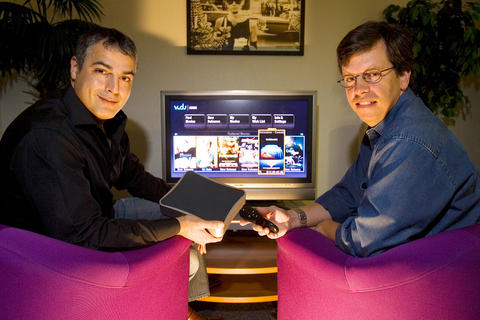The DVD became the most popular way to view movies for good reasons. The discs are sturdy, and the crisp images do not degrade with repeated showings. They take up little space. Some DVD players are cheaper than buying a DVD movie.
So why would anyone want to watch movies any other way? There is the bother of going to the neighborhood video store or waiting for delivery by mail. But downloading movies over a high-speed Internet connection offers the promise of convenience. You can get them delivered when you want.
Promise is the operative word for this new method. There are not a lot of titles available. Often the movies are not the latest releases. You may have to watch them on your computer monitor, not the 46-inch widescreen TV you just bought.

PHOTO: NY TIMES NEWS SERVICE
Consider what is probably the best movie-playing machine for downloads on the market today: the Microsoft Xbox 360, a video game console.
From setup to signup, to selecting a title and starting the show with a press of the remote's play button, the Xbox 360 is simple. It is as easy to use as the on-demand and pay-per-view services familiar to most watchers of cable or satellite TV.
But at US$400 for the model that includes a hard disk, which is needed to download movies, the Xbox is a big investment. If you aren't a gamer, it is hard to justify spending that amount just to watch a few movies.

PHOTO: NY TIMES NEWS SERVICE
The Xbox Live Marketplace has only 165 movies available. Ross Honey, Microsoft's senior director of the media and entertainment group, promised that more would be added each day. At US$4 for a new release that can be saved for up to 14 days on the hard drive, the service seems competitive with a rental from a Blockbuster store. As with all downloadable movie rentals, once you start watching one, you have only 24 hours to finish before it expires.
There are scores of alternatives, but at this stage the movie selection is a factor for each one. Steve Swasey, a Netflix spokesman, said: "Whether it's Netflix or Apple or Amazon or Wal-Mart.com, we're all facing the same constraint: title availability." Netflix, for example, has 80,000 titles on DVD, but only 2,000 for electronic delivery. Swasey said, "We believe DVDs will have a long life because the studios are not licensing vast amounts of content to anyone."
Most of these services - including MovieLink, CinemaNow, Vongo, Amazon's Unbox and Wal-Mart - send films straight to your computer. They require the installation of special movie manager software or a Web browser application specific to the service, but this isn't much of a bother. You also need to provide a credit card number when you sign up on a service's Web site.
The services, however, are intended to work only with Windows and its Internet Explorer. Apple's iTunes Store is the rare exception that works with both the Windows and Mac operating systems. A movie generally takes about an hour to download, although most services let you start watching before the download is finished.
Netflix cleverly ties its "Watch Now" collection to a dollar-an-hour scheme. Subscribers to the US$14.99 "two at a time" mail delivery plan, for instance, can watch up to 15 hours of movies a month. Netflix doesn't download the movies, but streams them so you watch them as they arrive. Vongo offers a US$9.99 a month all-you-can-eat plan to view as many of the service's 1,000-plus "subscription" movies as you like. These include popular recent movies like The Da Vinci Code and Click, yet the older Crouching Tiger, Hidden Dragon is offered as a pay-per-view rental option, one of 300 titles costing US$2.99 or US$3.99 each.
CinemaNow's twist is "Burn to DVD" movies for US$3.99 to US$14.99, but only 122 of its 4,000 movie and other video downloads can be burned to DVD. Basic Instinct, for instance, downloaded in about an hour and took about as long to burn to a blank DVD. The quality was not nearly as good as the store-bought DVD and barely better than an old VHS tape that has been played too often. But the downloads arrive with all the extras loaded on real DVDs, like outtakes, interviews with cast members and voiceover narrations by the director or writer.
MovieLink features more than 4,000 titles priced from US$1.99 to US$4.99 for rentals, and US$1.99 to US$19.99 to own. It was the most reliable of the services for watching downloads on an HDTV connected to a Windows Media Center PC. My copy of the movie Fur, starring Nicole Kidman, looked equally beautiful on both the smaller computer screen and an LCD HDTV in the living room.
Wal-Mart sells a DVD of the recent spy thriller Breach for US$19.87, but the store's online movie service sells a downloadable version for US$14.99. It has nothing to rent, though. Wal-Mart said new movies available for video download are for sale on the same day as the DVD release and cost between US$12.88 and US$19.88. Older titles start at US$7.50. Wal-Mart also offers the download of a second, portable copy of movie files that can be viewed on "PlaysForSure"-compatible devices like those offered by Creative and Archos.
Amazon's Unbox provided worthy rentals, like the recently released Notes on a Scandal for as little as US$0.99 during weekend sales. But typically the online merchant rents movies for US$2.99 or US$3.99. The library of more than 3,000 titles for purchase and 2,000 titles for rent ranged from mainstream blockbusters to how-to videos like How to Make It in Hollywood Before You Make It.
The Unbox service can be linked to a TiVo subscription. Movies purchased or rented on the site can be directed to a TiVo and watched on a TV instead of the computer screen. But most of these services download the movies to the PC, so you have to take another step to get them onto a TV. One way is to haul your PC (hopefully it is a notebook) to the living room. Plug the video cable - it may be the S-video plug or the newer DVI or HDMI plug - into the back of the set. The easiest choice for watching movies downloaded by computer was the US$300 Apple TV device, which acts like an iPod that uses your HDTV for a screen. (Apple TV does not work with standard definition TVs.)
Apple TV syncs with movies and TV episodes downloaded from the iTunes store, as well as with music, photos and other videos stored on your Mac or Windows PC. Setup was a no-brainer in typical Apple fashion. The movies cost between US$10 and US$15 to buy. But the selection is limited to only about 500 movies and 350 TV shows, according to Apple. The service doesn't rent movies, and the company would not comment on reports that it is in discussions with studios to offer rentals.
Apple TV also syncs movies and TV shows with video-capable iPods, which means you can start watching a movie on the train ride home, pause for dinner, then resume on the living room HDTV, right where you left off.
One upstart to keep an eye on is Vudu. The company promises - there is that word again - to offer 5,000 titles to watch directly on the TV without a PC, cable or satellite box. It says it has closed deals with seven major motion picture studios. The catch? Yet another appliance in your home. The Vudu device is expected to go on sale in this summer, but no price has been announced.
The range of movie download options keeps growing, and the promise is there. But for now, most people will keep watching DVDs - at least until tens of thousands of titles are available online.

In the March 9 edition of the Taipei Times a piece by Ninon Godefroy ran with the headine “The quiet, gentle rhythm of Taiwan.” It started with the line “Taiwan is a small, humble place. There is no Eiffel Tower, no pyramids — no singular attraction that draws the world’s attention.” I laughed out loud at that. This was out of no disrespect for the author or the piece, which made some interesting analogies and good points about how both Din Tai Fung’s and Taiwan Semiconductor Manufacturing Co’s (TSMC, 台積電) meticulous attention to detail and quality are not quite up to

April 21 to April 27 Hsieh Er’s (謝娥) political fortunes were rising fast after she got out of jail and joined the Chinese Nationalist Party (KMT) in December 1945. Not only did she hold key positions in various committees, she was elected the only woman on the Taipei City Council and headed to Nanjing in 1946 as the sole Taiwanese female representative to the National Constituent Assembly. With the support of first lady Soong May-ling (宋美齡), she started the Taipei Women’s Association and Taiwan Provincial Women’s Association, where she

It is one of the more remarkable facts of Taiwan history that it was never occupied or claimed by any of the numerous kingdoms of southern China — Han or otherwise — that lay just across the water from it. None of their brilliant ministers ever discovered that Taiwan was a “core interest” of the state whose annexation was “inevitable.” As Paul Kua notes in an excellent monograph laying out how the Portuguese gave Taiwan the name “Formosa,” the first Europeans to express an interest in occupying Taiwan were the Spanish. Tonio Andrade in his seminal work, How Taiwan Became Chinese,

Mongolian influencer Anudari Daarya looks effortlessly glamorous and carefree in her social media posts — but the classically trained pianist’s road to acceptance as a transgender artist has been anything but easy. She is one of a growing number of Mongolian LGBTQ youth challenging stereotypes and fighting for acceptance through media representation in the socially conservative country. LGBTQ Mongolians often hide their identities from their employers and colleagues for fear of discrimination, with a survey by the non-profit LGBT Centre Mongolia showing that only 20 percent of people felt comfortable coming out at work. Daarya, 25, said she has faced discrimination since she